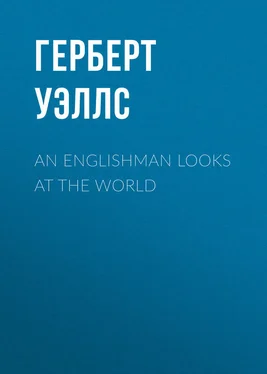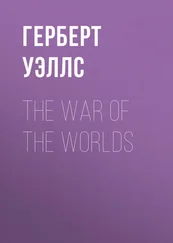Герберт Уэллс - An Englishman Looks at the World
Здесь есть возможность читать онлайн «Герберт Уэллс - An Englishman Looks at the World» — ознакомительный отрывок электронной книги совершенно бесплатно, а после прочтения отрывка купить полную версию. В некоторых случаях можно слушать аудио, скачать через торрент в формате fb2 и присутствует краткое содержание. Жанр: foreign_antique, foreign_prose, на английском языке. Описание произведения, (предисловие) а так же отзывы посетителей доступны на портале библиотеки ЛибКат.
- Название:An Englishman Looks at the World
- Автор:
- Жанр:
- Год:неизвестен
- ISBN:нет данных
- Рейтинг книги:4 / 5. Голосов: 1
-
Избранное:Добавить в избранное
- Отзывы:
-
Ваша оценка:
- 80
- 1
- 2
- 3
- 4
- 5
An Englishman Looks at the World: краткое содержание, описание и аннотация
Предлагаем к чтению аннотацию, описание, краткое содержание или предисловие (зависит от того, что написал сам автор книги «An Englishman Looks at the World»). Если вы не нашли необходимую информацию о книге — напишите в комментариях, мы постараемся отыскать её.
An Englishman Looks at the World — читать онлайн ознакомительный отрывок
Ниже представлен текст книги, разбитый по страницам. Система сохранения места последней прочитанной страницы, позволяет с удобством читать онлайн бесплатно книгу «An Englishman Looks at the World», без необходимости каждый раз заново искать на чём Вы остановились. Поставьте закладку, и сможете в любой момент перейти на страницу, на которой закончили чтение.
Интервал:
Закладка:
What new phase in the life of our nation and our Empire does this tremendous ceremony inaugurate? The question is inevitable. There is nothing in all the social existence of men so full of challenge as the crowning of a king. It is the end of the overture; the curtain rises. This is a new beginning-place for histories.
To us, the great mass of common Englishmen, who have no place in the hierarchy of our land, who do not attend Courts nor encounter uniforms, whose function is at most spectacular, who stand in the street and watch the dignitaries and the liveries pass by, this sense of critical expectation is perhaps greater than it is for those more immediately concerned in the spectacle. They have had their parts to play, their symbolic acts to perform, they have sat in their privileged places, and we have waited at the barriers until their comfort and dignity was assured. I can conceive many of them, a little fatigued, preparing now for social dispersal, relaxing comfortably into gossip, discussing the detail of these events with an air of things accomplished. They will decide whether the Coronation has been a success and whether everything has or has not passed off very well. For us in the great crowd nothing has as yet succeeded or passed off well or ill. We are intent upon a King newly anointed and crowned, a King of whom we know as yet very little, but who has, nevertheless, roused such expectation as no King before him has done since Tudor times, in the presence of gigantic opportunities.
There is a conviction widespread among us – his own words, perhaps, have done most to create it – that King George is inspired, as no recent predecessor has been inspired, by the conception of kingship, that his is to be no rôle of almost indifferent abstinence from the broad processes of our national and imperial development. That greater public life which is above party and above creed and sect has, we are told, taken hold of his imagination; he is to be no crowned image of unity and correlation, a layer of foundation-stones and a signature to documents, but an actor in our drama, a living Prince.
Time will test these hopes, but certainly we, the innumerable democracy of individually unimportant men, have felt the need for such a Prince. Our consciousness of defects, of fields of effort untilled, of vast possibilities neglected and slipping away from us for ever, has never really slumbered again since the chastening experiences of the Boer War. Since then the national spirit, hampered though it is by the traditions of party government and a legacy of intellectual and social heaviness, has been in uneasy and ineffectual revolt against deadness, against stupidity and slackness, against waste and hypocrisy in every department of life. We have come to see more and more clearly how little we can hope for from politicians, societies and organised movements in these essential things. It is this that has invested the energy and manhood, the untried possibilities of the new King with so radiant a light of hope for us.
Think what it may mean for us all – I write as one of that great ill-informed multitude, sincerely and gravely patriotic, outside the echoes of Court gossip and the easy knowledge of exalted society – if our King does indeed care for these wider and profounder things! Suppose we have a King at last who cares for the advancement of science, who is willing to do the hundred things that are so easy in his position to increase research, to honour and to share in scientific thought. Suppose we have a King whose head rises above the level of the Court artist, and who not only can but will appeal to the latent and discouraged power of artistic creation in our race. Suppose we have a King who understands the need for incessant, acute criticism to keep our collective activities intelligent and efficient, and for a flow of bold, unhampered thought through every department of the national life, a King liberal without laxity and patriotic without pettiness or vulgarity. Such, it seems to us who wait at present almost inexpressively outside the immediate clamours of a mere artificial loyalty, are the splendid possibilities of the time.
For England is no exhausted or decaying country. It is rich with an unmeasured capacity for generous responses. It is a country burthened indeed, but not overwhelmed, by the gigantic responsibilities of Empire, a little relaxed by wealth, and hampered rather than enslaved by a certain shyness of temperament, a certain habitual timidity, slovenliness and insincerity of mind. It is a little distrustful of intellectual power and enterprise, a little awkward and ungracious to brave and beautiful things, a little too tolerant of dull, well-meaning and industrious men and arrogant old women. It suffers hypocrites gladly, because its criticism is poor, and it is wastefully harsh to frank unorthodoxy. But its heart is sound if its judgments fall short of acuteness and if its standards of achievement are low. It needs but a quickening spirit upon the throne, always the traditional centre of its respect, to rise from even the appearance of decadence. There is a new quality seeking expression in England like the rising of sap in the spring, a new generation asking only for such leadership and such emancipation from restricted scope and ungenerous hostility as a King alone can give it…
When in its turn this latest reign comes at last to its reckoning, what will the sum of its achievement be? What will it leave of things visible? Will it leave a London preserved and beautified, or will it but add abundantly to the lumps of dishonest statuary, the scars and masses of ill-conceived rebuilding which testify to the aesthetic degradation of the Victorian period? Will a great constellation of artists redeem the ambitious sentimentalities and genteel skilfulness that find their fitting mausoleum in the Tate Gallery? Will our literature escape at last from pretentiousness and timidity, our philosophy from the foolish cerebrations of university "characters" and eminent politicians at leisure, and our starved science find scope and resources adequate to its gigantic needs? Will our universities, our teaching, our national training, our public services, gain a new health from the reviving vigour of the national brain? Or is all this a mere wild hope, and shall we, after perhaps some small flutterings of effort, the foundation of some ridiculous little academy of literary busybodies and hangers-on, the public recognition of this or that sociological pretender or financial "scientist," and a little polite jobbery with picture-buying, relapse into lassitude and a contented acquiescence in the rivalry of Germany and the United States for the moral, intellectual and material leadership of the world?
The deaths and accessions of Kings, the changing of names and coins and symbols and persons, a little force our minds in the marking off of epochs. We are brought to weigh one generation against another, to reckon up our position and note the characteristics of a new phase. What lies before us in the next decades? Is England going on to fresh achievements, to a renewed and increased predominance, or is she falling into a secondary position among the peoples of the world?
The answer to that depends upon ourselves. Have we pride enough to attempt still to lead mankind, and if we have, have we the wisdom and the quality? Or are we just the children of Good Luck, who are being found out?
Some years ago our present King exhorted this island to "wake up" in one of the most remarkable of British royal utterances, and Mr. Owen Seaman assures him in verse of an altogether laureate quality that we are now
"Free of the snare of slumber's silken bands," though I have not myself observed it. It is interesting to ask, Is England really waking up? and if she is, what sort of awakening is she likely to have?
Читать дальшеИнтервал:
Закладка:
Похожие книги на «An Englishman Looks at the World»
Представляем Вашему вниманию похожие книги на «An Englishman Looks at the World» списком для выбора. Мы отобрали схожую по названию и смыслу литературу в надежде предоставить читателям больше вариантов отыскать новые, интересные, ещё непрочитанные произведения.
Обсуждение, отзывы о книге «An Englishman Looks at the World» и просто собственные мнения читателей. Оставьте ваши комментарии, напишите, что Вы думаете о произведении, его смысле или главных героях. Укажите что конкретно понравилось, а что нет, и почему Вы так считаете.












